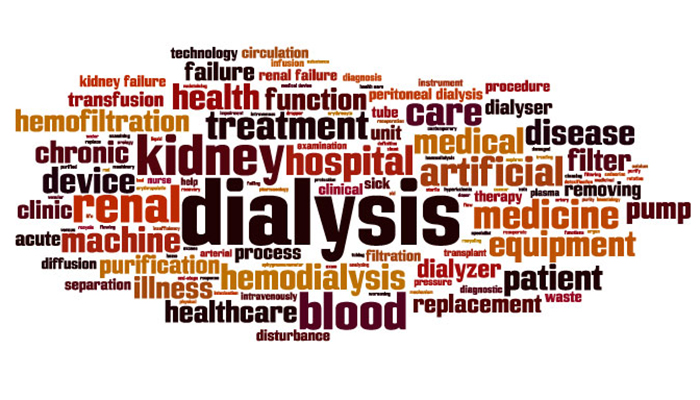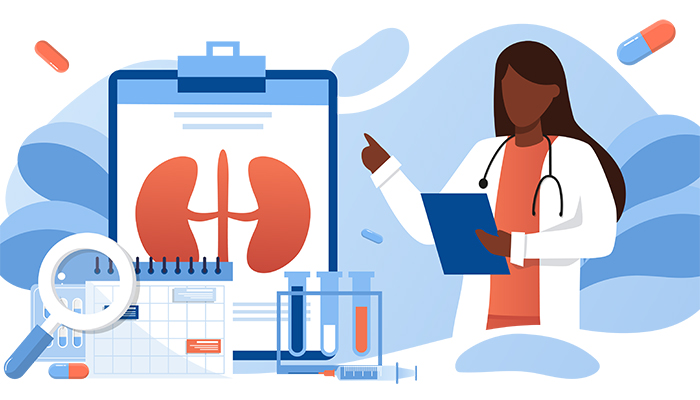Learn more at AgingWellMetroDC.com
Kidney Disease and Dialysis
Although dialysis is usually recommended with advanced kidney disease, you may want to take a step back and talk with your relative about their goals of care. How do they like to spend their time? What activities do they cherish? What makes life special?
Dialysis can buy time, but usually at the expense of quality of life. In fact, 25% of those who start dialysis eventually decide to stop it. The energy drain outweighs the benefits.
There is no one answer for everyone. This handout is designed to help you understand the choices so you can support your loved one whatever they decide about treatment.
The decision to start dialysis
 Dialysis mimics the cleansing function of the kidneys. It mechanically “rinses” the blood to take out toxins.
Dialysis mimics the cleansing function of the kidneys. It mechanically “rinses” the blood to take out toxins.
Dialysis is not a cure for kidney disease. But it does buy some time.
Permanent access into the body must be created. There are food restrictions and medications. Plus, your loved one must live by a strict dialysis schedule.
There are many side effects to manage. And dialysis will rely heavily on the help of family.
Some forms of dialysis may be completed at home. Others require travel to a facility. Home-based treatments allow for more flexibility of scheduling and a more normal life. There may be fewer food restrictions. And your loved one may feel better for a longer period of time. Home-based treatments require extreme self-discipline. Ongoing help and training of family or friends is critical.
Facility-based treatments typically occur three times a week. Each visit lasts for about four hours. Some patients enjoy socializing with others receiving treatment. Another bonus is regular check-ins with a specialist. On the down side, your relative will need transportation both ways. And recovery time afterward. Plus, they will have a period of declining energy before the next scheduled session.
All types of dialysis are expensive. Original Medicare pays for 80%. Check your loved one’s insurance to verify coverage for supplies, equipment, and services.
Before kidney disease becomes advanced, talk with the doctor about options. You may want to explore medical management without dialysis. (See article on the back of this page.)
Talk as a family about the daily impact of the disease, treatments, and side effects on all of you. What is the quality of life with dialysis? Without?
Return to topMedical management without dialysis

Dialysis typically buys a person some time. But it rules their life—and possibly yours. It requires strict adherence to the schedule. Also, severe food restrictions. Your relative’s energy level will fluctuate. That makes planning for other activities difficult. There is an increased chance of infection because of the access port for dialysis. And there are side effects: Itchy skin, trouble sleeping, headaches, and dizziness. Cramps, nausea, weight loss, and fragile bones are not uncommon.
Unless your relative is doing home dialysis, they will need transportation to and from the center. A typical schedule involves 2—3 four-hour sessions/week.
One option to consider is managing the disease without dialysis. Admittedly, this may shorten length of life. But even patients on dialysis often decide to stop the treatment when the difficulties outweigh the benefits.
People who say “no” to dialysis value quality of life. They prefer living on their own terms for eight months to living fifteen to twenty-four months with the rigors of dialysis.
People who receive the least benefits from dialysis are
- persons age 80 or older. Only 1:3 is alive two years into dialysis.
- persons with other serious conditions, such as heart disease or diabetes. Two years into dialysis, only 2:3 are still living. Only 1:3 if they have two serious illnesses.
- persons with dementia. The restrictions are difficult and the procedure is often scary for them.
Deciding against dialysis does not mean no treatment. Your relative’s doctor will prescribe medications for blood pressure and fluid buildup. And to address fatigue. All of these treatments support easier walking and breathing. A better daily experience.
Ask the doctor to talk about your relative’s best- and worst-case scenarios with and without dialysis.
Return to topThe decision to stop dialysis
Dialysis is life sustaining yet also quite taxing for the patient. About 25% of people who choose dialysis later decide to stop. Typically, this is because the burdens of this kidney disease treatment have severely reduced their quality of life. The tradeoff becomes no longer acceptable.
Ending dialysis is essentially a decision to let nature take its course. It means that death will follow in the near future. Patients make this choice to regain control of their life, even if only for a short while. This doesn’t end their being under a doctor’s care, but regular treatments and lab tests are no longer required. They can stop many medications, remove the access port, and eat a more enjoyable diet. Generally, they then have weeks of time to spend with family and friends—before growing weaker and sleepier, until they die.
Dying from kidney disease is typically peaceful and pain free. The discomforts can be managed. Most people choose hospice care. This includes weekly visits from a nurse and visits by a home health aide to assist with bathing. Social worker and chaplain services are also available.
If your loved one wants to stop dialysis, have them talk first with their health care provider. The dialysis team will want to know the reason. They may be able to adjust the treatment to ease difficulties.
If your relative remains resolved to quit, death is certain. They must have all affairs in order before stopping dialysis. This includes financial paperwork such as a will or trust, and a durable power of attorney. Also, a completed advance directive that names a health care decision maker and outlines treatments they do or don’t want when the end is near.
Rather than focus on shortened life, as a family take this time to express your love for each other. Enjoy the time you have left to make pleasant memories.
Contact us at 301-593-5285
